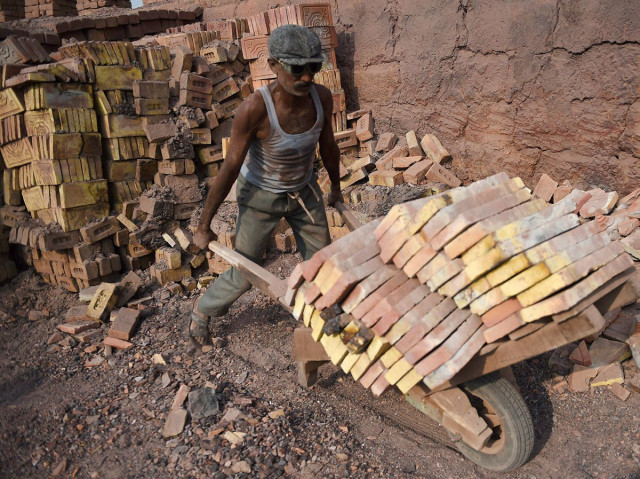Biting the dust: Legislation to redress workers’ grievances proves ineffectual
Kiln owners not abiding by the Minimum Wages Board directive .

Needless to say the employers are not supportive of the efforts of trade unions because slaves have no rights, and no union has ever succeeded in freeing a bonded labourer. PHOTO: AFP
Munir, who works at a kiln in Raiwind area, told The Express Tribune that a worker typically got around Rs400 per 1,000 bricks. He said they were paid even less in winter due to shorter working hours and reduced productivity. Munir said a family of three approximately produced 6,000 bricks per week during summer. He said this got halved to 3,000 bricks in the winter.
Workers said they had tried to raise their voice in this regard by forwarding complaints to District Vigilance Committees (DVC). Munir said he had attended a meeting six months ago to forward a complaint. He said nothing had come of it.
Syeda Ghulam Fatima of the Bonded Labour Liberation Front (BLLF), a member of 21 DVCs, said the phenomenon was prevalent in kilns across the province. She said this was due to the absence of a mechanism to ensure the effective implementation of legislation. She said most of the committees had not been functioning. Fatima told The Express Tribune that under the Bonded Labour System (Abolition) Rules 1995 committees were required to meet in the first week of every month. She said ensuring the holding of regular meetings was a task in itself.
Brick Kilns’ Owners Association general secretary Mehar Abdul Haq confirmed that workers were not paid in accordance with the wage set by the Minimum Wages Board. He said kiln owners had categorically told the government during consultation meetings that the amount fixed did not take ground realities in account. Haq said brick quality differed from area to area. Mehr said this accounted for price differentials. He said the association had decided to pay Rs750 in Lahore, Islamabad, Faisalabad, Kasur and Narowal. He said Rs550 was paid to workers in other areas of the Punjab.
Additionally the system of advance payment (peshgi) that had been declared illegal in the Bonded Labour System (Abolition) Act 1992 continues. Haq said no formal record of this had been kept as kiln owners were not allowed to conclude written contracts with workers. He said the system continued informally and the workers remembered the money they owed to kiln owners. Kiln workers posited a different story altogether. They said they had no idea regarding the interest charged. They said their loans were sometimes inflated after they switched employers. Workers said instead of asking owners for loans they preferred getting basic necessities from shopkeepers on deferred payment.
Integrated Programme for Elimination of Child Labour and Bonded Labour Director Jawed Iqbal Gill told The Express Tribune that the Labour Department did not have the manpower to ensure effective implementation of legislation by DVCs. He said this was exacerbated by the fact that bonded labour was not a priority for the district government as they had other pressing issues to deal with such as the recent fuel crisis.
Provincial Assembly Member (MPA) Saba Sadiq, a member of a DVC, said progress had been made on the issue of providing labourers with social security cards. She said a plan was in the offing to solve the payment issue by directing kiln owners to pay workers according to the number of workers in their family. Sadiq said efforts were underway to organise the next meeting of the committee at a kiln to get a grip of the situation. She said no date for the meeting had been set yet.
Published in The Express Tribune, February 5th, 2015.



















COMMENTS
Comments are moderated and generally will be posted if they are on-topic and not abusive.
For more information, please see our Comments FAQ